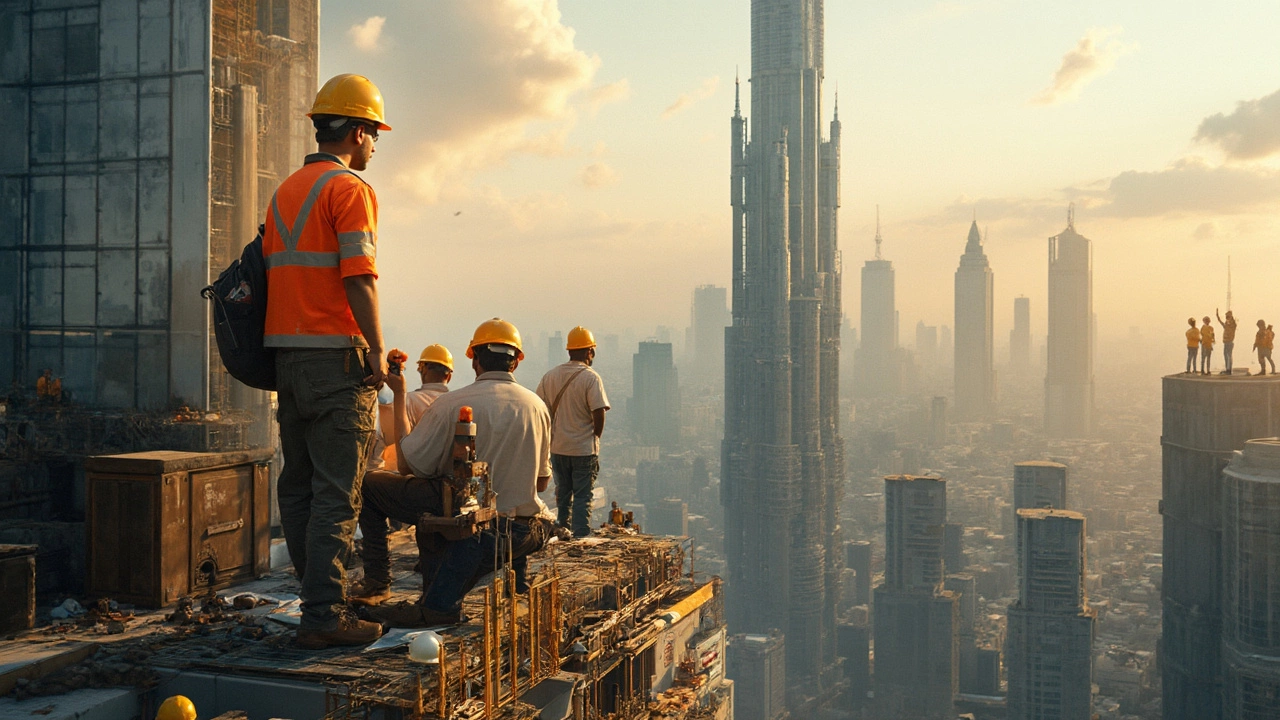Richest Contractor in Construction: Who Holds the Crown?

Ever wondered who the top dog in the construction world is? We're talking about the richest of them all. Let's get one thing straight—this isn't your average DIY fan. We're diving into billion-dollar blueprints and mega skyscrapers.
So who holds the title of the wealthiest contractor on the planet? It might not be who you think. These giants don't just build buildings; they build cities. And some of them might be household names, while others fly a bit under the radar.
Right at the top is the man, the myth, the legend: Spain's very own Rafael del Pino y Moreno, the ace behind Ferrovial. This guy’s journey is nothing short of impressive, and it’s all thanks to some savvy moves and big bets on global infrastructure projects.
- The Construction Giant at the Top
- How They Built Their Empire
- Secrets of Success in Construction
- Who Are the Close Competitors?
- Tips for Aspiring Contractors
The Construction Giant at the Top
When you're talking about the top construction tycoon, Rafael del Pino y Moreno's name lights up like a neon sign. Thanks to his savvy as CEO of Ferrovial, he's sitting pretty at the pinnacle of the construction industry. Founded way back in 1952 by Rafael's father, Ferrovial is now one of the most successful companies in the world, and Rafael is the driving force behind it.
With a net worth edging well into the billions, Rafael's not just wealthy—he's a game-changer. His strategic mind took Ferrovial from its Spanish roots and catapulted it onto the global stage. Known for extensive infrastructure projects, Ferrovial has a hand in everything from highways to airports, not to mention plenty of skyscraping ventures. The firm’s reach extends across the UK, Canada, and even the US.
Key Projects Over the Years
They're not just building for fun; they're reshaping skylines. Some of Ferrovial's standout projects include:
- The Heathrow Airport modernization in London, helping to streamline one of the world's busiest hubs.
- Building stretches of the Texas highway system, which speaks to their ability to handle massive infrastructure tasks.
- Phase one of London's Crossrail, which aims to revolutionize urban commuting.
These ventures underscore Ferrovial’s industry influence, securing Rafael's place atop the pecking order among construction billionaires.
Challenges and Triumphs
It's not always smooth sailing, though. The world of construction can be tumultuous—regulations, funding, and logistics can trip up even the best. But Rafael’s knack for innovation keeps him above water. By remaining adaptable and investing in sustainability and cutting-edge tech, he's navigated industry pitfalls and thrived.
Rafael del Pino's story is a masterclass in mixing vision with execution, proving you don't just need big machines—you need big ambitions. Not bad for someone who started off with a degree in civil engineering.
How They Built Their Empire
Rafael del Pino y Moreno, the name behind the powerhouse that is Ferrovial, didn’t just wake up one day with a gigantic company. Let’s break down how he climbed the ranks to become the richest contractor in the construction industry.
Foundations of Ferrovial
Founded by Rafael’s father back in 1952, Ferrovial wasn’t always an empire. Rafael took the reins in the late 1980s. His vision? Go global. He took bold steps into international markets, betting big on infrastructure projects around the world when many were still local players.
Strategic Acquisitions
Buying up companies left, right, and center is no small feat, but it’s a game Rafael mastered. His strategy was simple yet effective: acquire companies that complemented Ferrovial’s capabilities. Notable buys include British Airports Authority (BAA) in 2006, marking a significant move in the global airport scene.
Key Projects
Rafael's empire thrives on high-stakes projects. From Spain’s highways to London's Heathrow, Ferrovial had its hands on ambitious infrastructure. Such projects not only brought in massive revenues but also cemented their reputation as a leader in quality and innovation.
Financial Savvy and Diversification
But there’s more to this success story. It’s not all about concrete and cranes; it’s also about number crunching. Ferrovial diversified its portfolio, venturing into services, transport, and energy industries, ensuring it wasn’t overly reliant on one revenue stream.
Adaptation and Innovation
Construction is an industry ripe for change, and Rafael knew that staying ahead meant embracing new tech. Ferrovial adopted cutting-edge practices, like sustainable building methods and smart technologies, which not only improved efficiency but also enhanced project outcomes.
Lessons from the Top
So, what can –aspiring contractors take from this? It's about seizing opportunities, embracing innovation, and never shying away from a challenging project. More than just following trends, the key is setting them.
Over time, the ability of Rafael del Pino y Moreno to turn vision into reality has put Ferrovial at the forefront of the construction world. And that's how you build a billion-dollar empire from the ground up.

Secrets of Success in Construction
So, what's the magic sauce that makes someone the richest contractor in the world? It's not just about wearing a hard hat. Let’s break it down.
1. Strategic Vision
Top contractors have a knack for spotting opportunities where others see hurdles. Players like Rafael del Pino y Moreno didn't just randomly choose projects; they strategically built their empire with projects that promised high returns globally. That’s a big part of why they’re at the top.
2. Innovation and Technology
Keeping up with the tech trends is key. Whether it's using AI for project management or drones for site surveys, integrating technology streamlines operations and cuts costs. Companies leading the charge are those open to evolving and embracing new tech.
3. Building Relationships
Networking isn't just for office jobs—it's crucial in construction too. Strong relationships with suppliers, governments, and clients can make or break a deal. Top construction company leaders always focus on fostering these bonds to keep the projects and profits flowing.
4. Financial Prudence
Making millions is one thing, but keeping them is another. Successful contractors know how to manage budgets and reinvest profits wisely. They follow the money but don't let it leak through the gaps.
5. Delivering Quality
Reputation is everything. To become a titan, one must deliver top-notch quality, creating buildings and structures that last. Loyalty from returning clients and word-of-mouth referrals is built on consistent quality.
| Year | Investment in Technology (Billion USD) |
|---|---|
| 2020 | 15 |
| 2023 | 22 |
See, those crème-de-la-crème players didn't just stumble their way to wealth. They strategically climbed to the top.
Who Are the Close Competitors?
In the bustling and ever-evolving world of construction, richest contractor and company titles aren't static—they're dynamic, with frequent reshuffling. While Rafael del Pino y Moreno sits high on the throne, there's a league of other titans not far behind him. Let's take a stroll through this realm of fascinating competitors who shape our skylines and fortunes.
1. The Vinci Group
Based in France, Vinci is one of the largest construction companies globally and a close competitor. The company is led by Xavier Huillard and has made its fortune through its numerous airport and motorway projects. And here’s a mind-blowing stat: Vinci operates in about 100 countries and employs around 200,000 people.
2. ACS Group
Coming from sunny Spain, ACS Group is led by Florentino Pérez, who is also known for his role as the president of Real Madrid. Talk about wearing many hats! ACS made its name with some jaw-dropping infrastructure projects, like high-speed railways and highways stretching across Europe and the Americas.
3. China State Construction Engineering
The Chinese construction behemoth is right up there, snapping at the heels of the top. With Chang Zhenming at the helm, this company is known for massive residential projects, government buildings, and commercial properties. They operate on a mind-boggling scale you wouldn't believe until you see it. If you ever wondered about where the word ‘megaproject’ comes into play, this is it.
4. Bechtel Corporation
An American giant, Bechtel has been involved in iconic projects like Hoover Dam and the Channel Tunnel. The company's ability to handle complex infrastructure projects and manage substantial energy ventures keeps it a serious player on the board. They're the go-to for projects where failure is simply not an option.
These companies, with their visionary leadership and innovative projects, make the construction industry one of the most dynamic and competitive fields. They haven't just nailed the art of building—they've built the future.

Tips for Aspiring Contractors
If you're dreaming about becoming the next big thing in the construction industry, you're not alone. Here's how you can lay down a solid foundation for your contractor career.
Get Your Basics Right
First off, make sure you're armed with the right knowledge. A background in civil engineering or construction management can be a game-changer. Learning on the job is great, but formal education can set you apart.
Build Experience
There's no shortcut to experience. Start small, maybe with local projects, and then gradually pick up bigger gigs. The more hands-on you get, the better you'll understand the ins and outs of construction projects.
Network Like a Pro
Being well-connected is half the battle. Whether you're meeting potential clients or fellow contractors, every handshake counts. Join industry groups, attend meet-ups, or even engage online. You never know where an opportunity might pop up.
Embrace Technology
Gone are the days of pen and paper. Modern construction is all about embracing technology. Whether it's using project management software or drones on site, staying tech-savvy will keep you ahead of the curve.
Stay Financially Savvy
Understanding the money side of things is crucial. You need to budget wisely and manage finances efficiently. Consider consulting with a financial advisor who knows the construction game.
Be Ready to Adapt
The construction world is always shifting. Regulations change, client preferences evolve, and new technologies emerge. The best contractors are the ones who can adapt quickly.
Keep Learning
Attend workshops, take courses, and always be in learning mode. The more skills you have, the more valuable you'll become. Remember, even the richest contractor started somewhere.